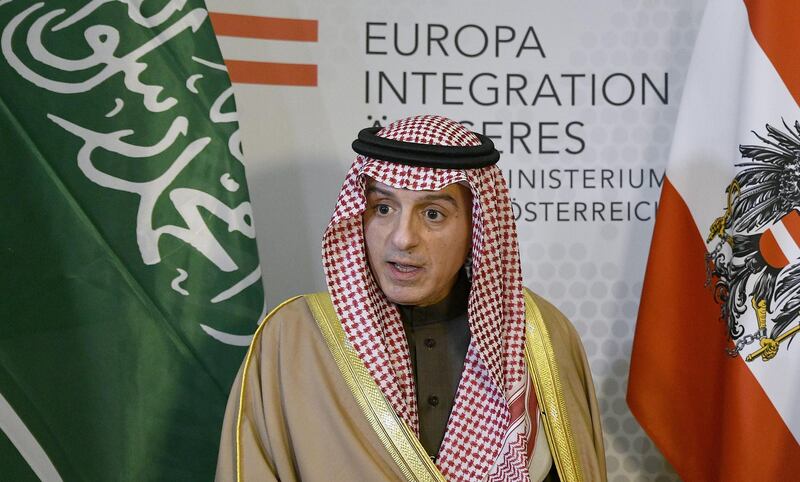Saudi foreign minister Adel Al Jubeir said on Monday that his country has no interest in taking part in an EU-style regional security alliance as proposed by Qatar.
Emir of Qatar Sheikh Tamim bin Hamad said on Friday that countries in the Middle East should put their differences aside and forge a security pact similar to that of the EU.
"We already have a structure in place," said Mr Al Jubeir in Vienna on the sidelines of a meeting with the Austrian foreign minister.
He was referring to the Gulf Co-operation Council, a 36-year-old political and trading bloc of the Arabian Gulf states – that includes Saudi Arabia, the UAE, Bahrain, Kuwait, Oman, and Qatar.
Saudi Arabia, the UAE, Bahrain and Egypt cut all diplomatic and transport ties with Doha in June last year over its support extremists and terrorist groups.
"It is our hope that the Qataris will do the right thing and stop their support for terrorism,” said Mr Al Jubeir.
___________
Read more:
Qatari sheikh welcomed to his 'second home' by UAE's leaders
UAE's Gargash says Qatar will remain in dire situation despite investments
___________
“Should they do so, they will become a welcome member of the GCC and we can move forward to improve the security for all of us.”
On Tuesday morning, UAE's Minister of State for Foreign Affairs Anwar Gargash said that Qatar's only way out of the crisis is to "change its direction".
"My main concern is for Doha to be wise and for its leadership to realise that its fragmented efforts are only deepening its crisis, and salvation lies in changing its direction," he said on Twitter.
لا يسعني هذا الصباح إلا أن أشكر الإعلام القطري ومغرديه إهتمامهم بتغريداتي، همّي الأساسي أن تتمكن الحكمة في الدوحة وأن تدرك قيادتها أن جهودها المبعثرة الحالية تعمّق أزمتها، وأن الخلاص في تغييّر التوجه.
— د. أنور قرقاش (@AnwarGargash) February 20, 2018
Mediation efforts by Kuwait and the US to end the rift have failed to produce results.
The four Arab countries stand firm by their decision to boycott Qatar, saying they are willing to re-establish communications with Doha only if it adheres to regional and international agreements and the demands and principles they have issued.
Doha has so far refused to meet the quartet's 13 demands – including the closure of Qatar-owned Al Jazeera news channel, which the quartet says provides a platform for extremists and dissidents.






